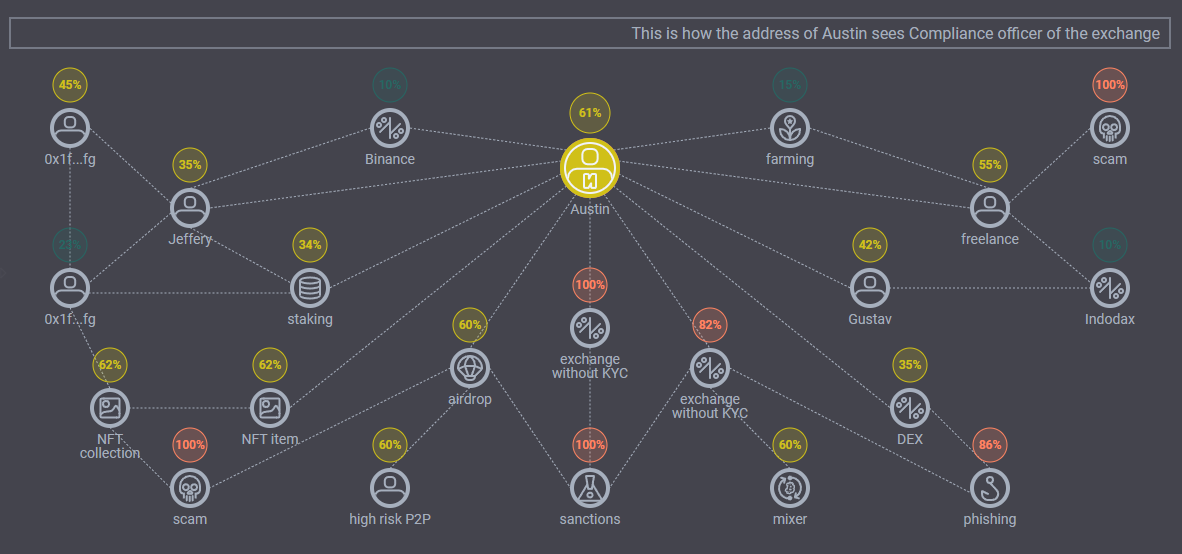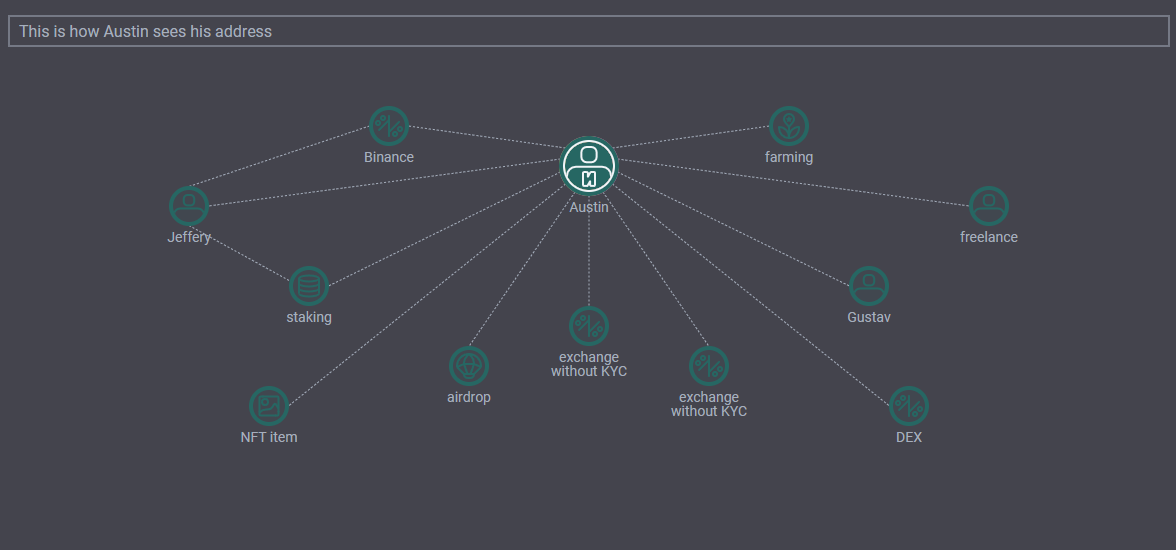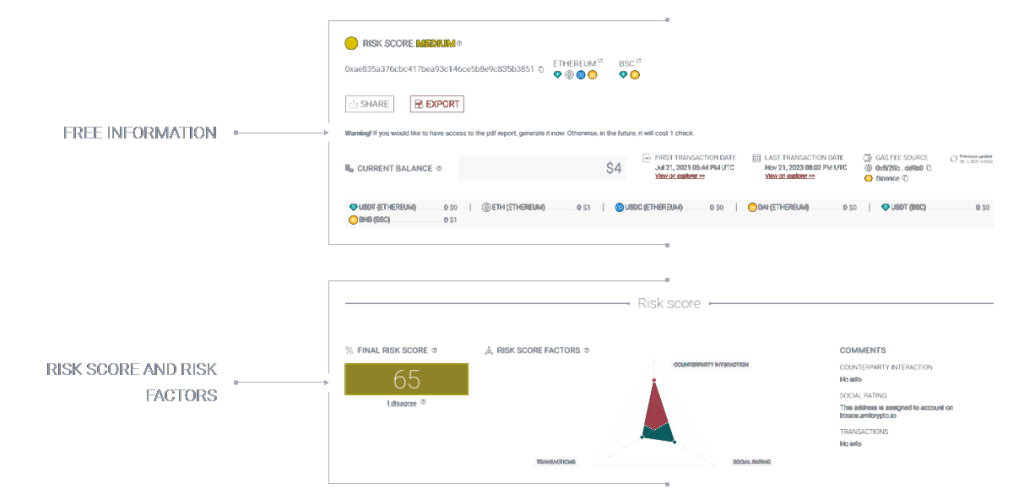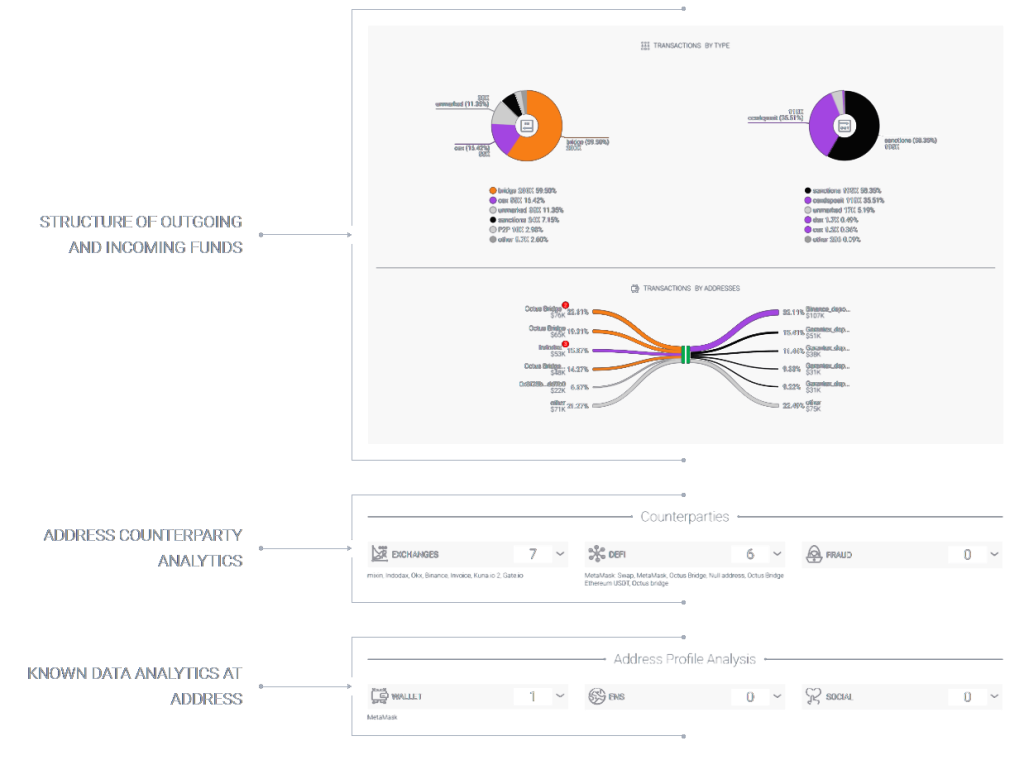Checking a crypto wallet for connection with “dirty” money will allow:
protect yourself from "dirty" assets
knowing the origin of counterparty funds
prevent blocking of funds
due to high risk score
get out of trouble with the law
on suspicion of money laundering

You don't have to do anything bad to get blocked
— it is enough not to be interested in the history of the origin of funds of counterparties
Let’s imagine Austin , a 28-year-old crypto user living in a large city and working as a systems analyst in a successful IT company. His stable salary is complemented by additional income from various freelance projects, which allows him to periodically invest in cryptocurrencies.
Austin was introduced to the world of cryptocurrencies by his childhood friend Jeffery , a professional gamer who is actively involved in staking. The first fiat-to-cryptocurrency exchange deal was made with Jeffery, as there was a high level of trust between them.


Check crypto wallet. Free.
Works with Ethereum, BSC, Bitcoin, Tron, Everscale, Venom (soon)
Why is it important to check?

Inability to find evidence of a particular transaction
Inability to find evidence of a particular transaction

Inability to find evidence of a particular transaction
Inability to find evidence of a particular transaction

Inability to find evidence of a particular transaction
Inability to find evidence of a particular transaction

Inability to find evidence of a particular transaction
Inability to find evidence of a particular transaction

Inability to find evidence of a particular transaction
Inability to find evidence of a particular transaction
Report Structure


The price of security for your cryptocurrencies

Check Quality Assurance
Check it out for free – we will give you a unique opportunity to look at cryptocurrency wallets through the eyes of an exchange compliance manager and see how our service works in practice.

Best Price Guarantee
The service is built on our own technological base, so we give a better price than any third-party solution reseller.

FAQ
This is a percentage risk score expressed as a value from 0 to 100, which takes into account the history of the formation of funds on a cryptocurrency address, the likelihood of being associated with illegal activity, user behavior, as well as known information about the address, its cluster and owner.
When receiving dirty funds to your cryptocurrency address, you need to:
- Stop accepting new funds to this address until all circumstances are clarified.
- Collect all information about the origin of funds.
- Be ready to undergo extended KYC, structure information about the origin of your transactions, enriching the data with evidence (screenshots of correspondence, letters confirming exchange transactions, …).
- Be as open as possible when communicating with VASPs (crypto exchangers, exchanges, …) or law enforcement agencies when inquiries arise.
It is possible to improve the Risk Score, but the higher the Risk Score of the address and the more transactions it contains, the more difficult it will be to do.
When lowering the Risk Score of an address, there are several factors to consider:
Reducing the Risk Score is possible only if the address is in the green zone (0% -39%) risk or the yellow zone (40% -69%) risk
The Risk Score is based on the source of origin of funds, therefore, if the address has most of the funds of high-risk origin, then it is practically impossible to reduce its Risk Score
Reducing the Risk Score by adding information that reveals the identity of the owner is possible only if the address is new with small turnover.
This is a percentage risk score expressed as a value from 0 to 100, which takes into account the history of the formation of funds on a cryptocurrency address, the likelihood of being associated with illegal activity, user behavior, as well as known information about the address, its cluster and owner.
When receiving dirty funds to your cryptocurrency address, you need to:
- Stop accepting new funds to this address until all circumstances are clarified.
- Collect all information about the origin of funds.
- Be ready to undergo extended KYC, structure information about the origin of your transactions, enriching the data with evidence (screenshots of correspondence, letters confirming exchange transactions, …).
- Be as open as possible when communicating with VASPs (crypto exchangers, exchanges, …) or law enforcement agencies when inquiries arise.
It is possible to improve the Risk Score, but the higher the Risk Score of the address and the more transactions it contains, the more difficult it will be to do.
When lowering the Risk Score of an address, there are several factors to consider:
Reducing the Risk Score is possible only if the address is in the green zone (0% -39%) risk or the yellow zone (40% -69%) risk
The Risk Score is based on the source of origin of funds, therefore, if the address has most of the funds of high-risk origin, then it is practically impossible to reduce its Risk Score
Reducing the Risk Score by adding information that reveals the identity of the owner is possible only if the address is new with small turnover.
This is a percentage risk score expressed as a value from 0 to 100, which takes into account the history of the formation of funds on a cryptocurrency address, the likelihood of being associated with illegal activity, user behavior, as well as known information about the address, its cluster and owner.
When receiving dirty funds to your cryptocurrency address, you need to:
- Stop accepting new funds to this address until all circumstances are clarified.
- Collect all information about the origin of funds.
- Be ready to undergo extended KYC, structure information about the origin of your transactions, enriching the data with evidence (screenshots of correspondence, letters confirming exchange transactions, …).
- Be as open as possible when communicating with VASPs (crypto exchangers, exchanges, …) or law enforcement agencies when inquiries arise.
It is possible to improve the Risk Score, but the higher the Risk Score of the address and the more transactions it contains, the more difficult it will be to do.
When lowering the Risk Score of an address, there are several factors to consider:
Reducing the Risk Score is possible only if the address is in the green zone (0% -39%) risk or the yellow zone (40% -69%) risk
The Risk Score is based on the source of origin of funds, therefore, if the address has most of the funds of high-risk origin, then it is practically impossible to reduce its Risk Score
Reducing the Risk Score by adding information that reveals the identity of the owner is possible only if the address is new with small turnover.
This is a percentage risk score expressed as a value from 0 to 100, which takes into account the history of the formation of funds on a cryptocurrency address, the likelihood of being associated with illegal activity, user behavior, as well as known information about the address, its cluster and owner.
When receiving dirty funds to your cryptocurrency address, you need to:
- Stop accepting new funds to this address until all circumstances are clarified.
- Collect all information about the origin of funds.
- Be ready to undergo extended KYC, structure information about the origin of your transactions, enriching the data with evidence (screenshots of correspondence, letters confirming exchange transactions, …).
- Be as open as possible when communicating with VASPs (crypto exchangers, exchanges, …) or law enforcement agencies when inquiries arise.
It is possible to improve the Risk Score, but the higher the Risk Score of the address and the more transactions it contains, the more difficult it will be to do.
When lowering the Risk Score of an address, there are several factors to consider:
Reducing the Risk Score is possible only if the address is in the green zone (0% -39%) risk or the yellow zone (40% -69%) risk
The Risk Score is based on the source of origin of funds, therefore, if the address has most of the funds of high-risk origin, then it is practically impossible to reduce its Risk Score
Reducing the Risk Score by adding information that reveals the identity of the owner is possible only if the address is new with small turnover.
Did you not
understand
something?
You can ask any question of interest to our caring technical support
Check crypto wallet. Free.
Works with Ethereum, BSC, Bitcoin, Tron, Everscale, Venom (soon)
